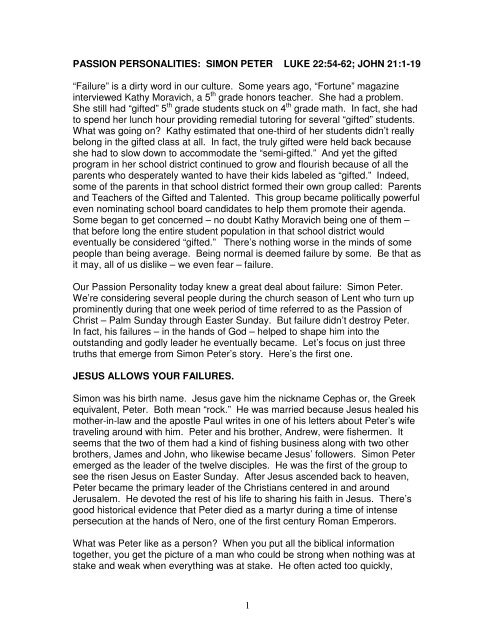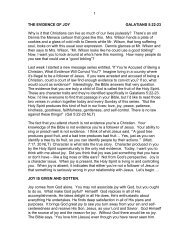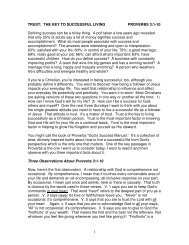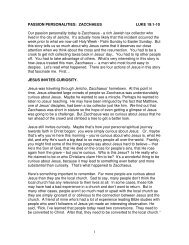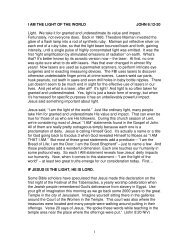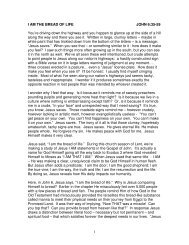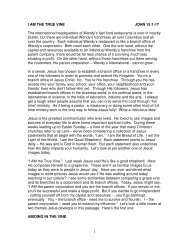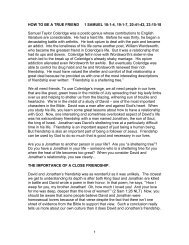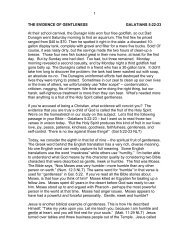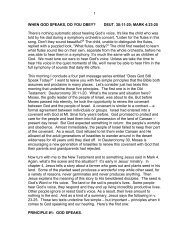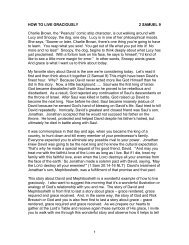SIMON PETER LUKE 22:54-62; JOHN 21:1-19 - Karl Road Baptist ...
SIMON PETER LUKE 22:54-62; JOHN 21:1-19 - Karl Road Baptist ...
SIMON PETER LUKE 22:54-62; JOHN 21:1-19 - Karl Road Baptist ...
You also want an ePaper? Increase the reach of your titles
YUMPU automatically turns print PDFs into web optimized ePapers that Google loves.
PASSION PERSONALITIES: <strong>SIMON</strong> <strong>PETER</strong> <strong>LUKE</strong> <strong>22</strong>:<strong>54</strong>-<strong>62</strong>; <strong>JOHN</strong> <strong>21</strong>:1-<strong>19</strong>“Failure” is a dirty word in our culture. Some years ago, “Fortune” magazineinterviewed Kathy Moravich, a 5 th grade honors teacher. She had a problem.She still had “gifted” 5 th grade students stuck on 4 th grade math. In fact, she hadto spend her lunch hour providing remedial tutoring for several “gifted” students.What was going on? Kathy estimated that one-third of her students didn’t reallybelong in the gifted class at all. In fact, the truly gifted were held back becauseshe had to slow down to accommodate the “semi-gifted.” And yet the giftedprogram in her school district continued to grow and flourish because of all theparents who desperately wanted to have their kids labeled as “gifted.” Indeed,some of the parents in that school district formed their own group called: Parentsand Teachers of the Gifted and Talented. This group became politically powerfuleven nominating school board candidates to help them promote their agenda.Some began to get concerned – no doubt Kathy Moravich being one of them –that before long the entire student population in that school district wouldeventually be considered “gifted.” There’s nothing worse in the minds of somepeople than being average. Being normal is deemed failure by some. Be that asit may, all of us dislike – we even fear – failure.Our Passion Personality today knew a great deal about failure: Simon Peter.We’re considering several people during the church season of Lent who turn upprominently during that one week period of time referred to as the Passion ofChrist – Palm Sunday through Easter Sunday. But failure didn’t destroy Peter.In fact, his failures – in the hands of God – helped to shape him into theoutstanding and godly leader he eventually became. Let’s focus on just threetruths that emerge from Simon Peter’s story. Here’s the first one.JESUS ALLOWS YOUR FAILURES.Simon was his birth name. Jesus gave him the nickname Cephas or, the Greekequivalent, Peter. Both mean “rock.” He was married because Jesus healed hismother-in-law and the apostle Paul writes in one of his letters about Peter’s wifetraveling around with him. Peter and his brother, Andrew, were fishermen. Itseems that the two of them had a kind of fishing business along with two otherbrothers, James and John, who likewise became Jesus’ followers. Simon Peteremerged as the leader of the twelve disciples. He was the first of the group tosee the risen Jesus on Easter Sunday. After Jesus ascended back to heaven,Peter became the primary leader of the Christians centered in and aroundJerusalem. He devoted the rest of his life to sharing his faith in Jesus. There’sgood historical evidence that Peter died as a martyr during a time of intensepersecution at the hands of Nero, one of the first century Roman Emperors.What was Peter like as a person? When you put all the biblical informationtogether, you get the picture of a man who could be strong when nothing was atstake and weak when everything was at stake. He often acted too quickly,1
thought too slowly and spoke too much. That resulted in failure. Once, Jesusenabled him to walk on water miraculously, but then Peter lost faith and almostdrowned. On another occasion, the Holy Spirit enabled Peter to see Jesus forwho He truly was. Peter proclaimed, “…‘You are the Christ, the Son of the livingGod.’ Jesus replied, ‘Blessed are you, Simon son of Jonah, for this was notrevealed to you by man, but by my Father in heaven.’" (Matthew 16:16-17 NIV)But shortly after that perceptive confession, Jesus rebukes Peter sternly. Jesusis predicting His coming suffering and death on the cross and Peter isn’t havingany of that. Finally, Jesus turns to Peter and says, “… ‘Get behind me, Satan!You are a stumbling block to me; you do not have in mind the things of God, butthe things of men.’" (Matthew 16:23 NIV) Ouch! Can’t you just hear Petermumbling to himself? “One day God speaks through me. The next day Satanspeaks through me. What gives?” That touches on one reason for spiritualfailure: ignorance of your personal weaknesses. That was Peter. Sadly, it alsodescribes us and why we fail so often as well.Peter’s greatest failure was his denial of a personal relationship with Jesus. Onthe night Jesus was arrested, Jesus predicted all of the twelve disciples wouldcut and run. Peter protests, “…‘Lord, I am ready to go to prison with you, andeven to die with you.’” (Luke <strong>22</strong>:33 NLT) Jesus’ response? “…‘ Peter, let me tellyou something. Before the rooster crows tomorrow morning, you will deny threetimes that you even know me.’” (Luke <strong>22</strong>:34 NLT) Of course, Peter refused tobelieve himself capable of such a thing and said so. Later that same night, Jesusis in the Garden of Gethsemane agonizing in prayer. Peter and the otherdisciples slept instead of praying as Jesus asked them to do. There’s yetanother reason for spiritual failure: an unwillingness to pray and access thepower God alone can give you. Jesus is arrested and the Bible says “…Peterfollowed at a distance.” (Luke <strong>22</strong>:<strong>54</strong> NIV) That’s a poignant phrase, isn’t it? Youcan do that both literally and spiritually – follow Jesus at a distance. And thatreveals yet another reason behind spiritual failure: trying to follow Jesus at adistance. Like Peter tried to do literally that night, you can try to do spiritually:follow Jesus at a comfortable, safe distance. You want to get close enough toJesus to cash in on all of that good stuff: sins forgiven… eternal life… answersto prayer, but not close enough to let Jesus change you from the inside out.So let’s read what happened next (Luke <strong>22</strong>:<strong>54</strong>-<strong>62</strong>). It wasn’t just the roostercrowing for the third time that reminded Peter of Jesus’ prediction; it was the lookof Jesus. Don’t you wonder what Peter saw in Jesus’ look that night? Was itanger? Disgust? Was it a “I told you so” look? No, I believe it must have been alook of profound love – a kind of love that could be, on the one hand, deeplywounded and yet, on the other hand, reach out to Peter with forgiveness, graceand patience. I believe it was Jesus’ look that broke Peter’s heart. He wentoutside and wept like he’d never wept before.Jesus allowed Peter to fail. He knew it was coming. He even told Peter what hewould do. Could Jesus have prevented Peter’s meltdown? Yes, but He didn’t.2
Nor did He cause Peter to fail. But why didn’t Jesus rescue Peter from thishumiliating experience? Ultimately, God uses your spiritual failure and mine todraw us closer to Himself. When you commit a sin or you fail spiritually in someway, God shines a light on your weakness and inadequacy. He is faithful toshine a light on areas in your inner life where you stubbornly refuse to surrenderto Him. Often, you and I don’t like to face up to our capacity for sin and failure.But God knows better. And so God will allow you to fail, just like He allowedPeter to fail. It’s not because He hates you or wants to shame you. His mainpurpose in allowing failure is to help you to stop trusting in yourself. Allowing youto fail is God’s way of destroying sinful self-confidence in you and me. Peterneeded to face the fact he was a sinner. Peter needed to stop trusting in Peter.So do you. So do I. Nothing reveals your incredible need for God and His gracemore quickly than when you fail. Ironically, allowing you to fail can be ademonstration of God’s severe mercy working in your life. Here’s a second truth.JESUS CONFRONTS YOUR FAILURES.Let’s read another story about Simon Peter (John <strong>21</strong>:1-<strong>19</strong>). That scene tookplace a few weeks after Jesus’ resurrection. Peter and these six other discipleshad endured both the brutality of Jesus’ crucifixion and then the unbelievable joyof seeing Him risen from the dead. Now what? They decided to do what theyknew how to do: fish. They fished all night but caught nothing. At first, theydidn’t recognize Jesus on the shore. But after their miraculous catch of fish, theyknew it was Him. And, then, it was Peter – wonderfully impetuous, impulsivePeter – who jumps into the water and swims for shore. When they finally allarrive, the risen Jesus is there and He’s made them breakfast on the beach.Everything about that scene must have reminded Simon Peter of his failures. Hewas a fisherman by trade, but the fish cooking on the fire and the lapping wavesreminded him that without Jesus he couldn’t even catch fish very well! As helooked at the other disciples, he must have wondered what they thought of him.By now, they were aware of his cowardly denial. Jesus used charcoal to makethe fire on the beach that morning. I’m fascinated by the fact that only one othertime in all of the Bible is a charcoal fire specifically mentioned. We read it thismorning – the Luke <strong>22</strong> passage. The fire in the high priest’s courtyard the nightPeter denied Jesus was a charcoal fire. Your sense of smell can arousepowerful memories, am I right? If I was in Florida and walked through an orangegrove, I know that just the smells of those oranges would bring back a flood ofmemories when I lived there as a kid. Don’t you think that as Simon Peter sat onthat beach – the pungent odor of charcoal filling the air – that he recalled thatawful night in the high priest’s courtyard? That night he failed so miserably?Jesus then asks Peter a question that must have felt like the blow of a hammer.“… ‘Simon, son of John, do you love me more than these?’…” (John <strong>21</strong>:15MSG) No doubt Peter’s heart began to pound, his cheeks burned with shame,his pulse quickened and his eyes misted over when he heard that question. “…3
‘Yes, Master, you know I love you.’…” (John <strong>21</strong>:15 MSG) Three times Jesusasked Peter the same question, “Do you love Me?” Three times Peter haddenied even knowing Jesus. Three times Jesus gave Peter the opportunity toreaffirm his love and devotion for Jesus. No boasting, bravado and bluster now.No macho spirituality. I can’t read that scene without imagining the grief thatmust have welled up inside of Simon Peter when he said, “… ‘Master, you knoweverything there is to know. You've got to know that I love you.’…” (John <strong>21</strong>:17MSG) There’s a profound shift in that response. Peter’s old, prideful selfconfidencewas gone – the arrogance, the boastfulness, the certainty that hisallegiance for Jesus was superior to everyone else’s. Now, Peter’s confidencewas in Jesus’ knowledge of him – flaws and all, warts and all, blemishes and all.Does the way Jesus handled Peter here seem kind of harsh or “in your face”?Jesus knew that when you truly love another person, you’re willing both to beheld accountable by that person and to hold that person accountable. Yes, itwas indeed a painful moment. Confrontation usually is painful. That’s why all ofus want to avoid it. But true love will endure confrontation because it values theperson and the relationship. How we need to remember that simple truth in ourmarriages… with our children… with our friends! How we need to remember thatsimple truth in the local church! Jesus’ purpose here was not to hurt Peter butrather to heal him. Peter had denied Jesus three times. Now he’s given theopportunity to reaffirm his love for Jesus three times. If Jesus had neveraddressed this issue directly with Peter, the effect of his denial would havecontinued to fester in his soul for who knows how long.Furthermore, it needed to be done publicly to some degree. Why? Peter’sdenial had been very public. So his restoration needed to be public, too. Thoseother disciples needed to know his past failure was truly in the past – forgivenand set aside forever. Simon Peter had been both forgiven and commissionedfor service by Jesus Himself. There’s a lesson here for you and me. God healsyour sins and spiritual failures not by allowing you to run away from them, excusethem or rationalize them, but instead by confronting them. He will allow you tofail when it’s for your own good. He will also confront you when you do fail, soHe can restore you. But it’s a confrontation designed to heal not hurt, restore notdestroy and renew the relationship not end it.It seems that we hear about politicians getting involved in sex scandals everyother day. Do you remember Donna Rice? She got involved with then SenatorGary Hart from Colorado. In the aftermath, Hart’s bid for the <strong>19</strong>88 Democraticpresidential nomination went down the tubes and so did Donna Rice’s reputation.She disappeared from the public eye for awhile. She became a follower of Jesusduring that awful time and got married, too. Now she heads up a Christianorganization called “Enough is Enough” fighting to keep pornography out of thehands of children. Here’s something she said about failure that’s worth hearing.“God loves us, but He doesn’t grant us immunity from the consequences of ourchoices. However, when we mess up, if we ask His forgiveness, He’ll redeem4
those choices, using our mistakes as a ‘door of hope’ for other people…. Godhas brought purpose to my pain.” Here’s a third insight or truth from SimonPeter’s story.JESUS REDEEMS YOUR FAILURES.Feelings of failure come in many different shapes, colors, sizes and shapes,don’t they? Maybe you feel as if you never met your parents’ expectations.Perhaps you’ve committed a sin that seems unforgiveable to you. Maybe youstruggle with a powerful addiction today – alcohol, drugs, pornography, money.You wonder if you can ever get free. It may be that your marriage has failed inthe past or is failing at this very moment. Perhaps there’s bitterness andbrokenness between you and your parents or between you and your children.Maybe there’s a business or financial failure in your past. Failure has a thousandfaces. The fact is that all of us and each of us has failed somewhere at sometime at some thing. The Bible says, “For everyone has sinned; we all fall short ofGod’s glorious standard.” (Romans 3:23 NLT) We live in a world that doesn’tforgive failure easily or well. But God isn’t intimidated by your failures. That’swhy He sent Jesus into the world. He has the power to redeem each one.The fact is that each of us is very much like Peter on that cool, fresh morningbeside the Sea of Galilee. You and I are in great need of the healing touch ofJesus somewhere in our lives. Jesus said, “… ‘But he who has been forgivenlittle loves little.’” (Luke 7:47 NIV) Surely, the reverse is true: the one who hasbeen forgiven much loves much. That’s Simon Peter! That’s you and me, too.How can God redeem your failures? How can He bring good out of them? First,failure that gets redeemed allows you to be more compassionate towards others.You can identify with the failures and disappointments in other people’s lives nowin a spiritually healthy way. You can extend love, grace and acceptance topeople who fall and fail. When that happens, you can be used of God powerfullybecause you become His channel of love and grace into their lives.Second, failure that gets redeemed prepares you to serve God more effectively.As Jesus is restoring Peter, He says, “… ‘Then feed my lambs… Then take careof my sheep… Then feed my sheep.’” (John <strong>21</strong>:15, 16, 17 NLT) Jesus renewsPeter’s calls to serve Him. History tells us that Simon Peter went on to becomethe greatest leader among Christians in the first century with the exception of theapostle Paul. But it was a very different Peter now – chastened, humbled, Godconfidentnot self-confident, filled with a new compassion and tenderness forothers. Simon Peter is a picture of how Jesus redeems failure.Third, failure that gets redeemed enables you to be filled with God’s love. Whatdoes God really want to achieve in this life? It’s not financial wealth, fame,success as the world defines it or comfort. God’s ultimate goal is to get you tolove like He loves. If you can learn how to love Him and to love others, the realpurpose of your life has been achieved. In one of his letters, Peter writes, “Love5
each other as brothers and sisters. Be tenderhearted, and keep a humbleattitude. Don’t repay evil for evil. Don’t retaliate with insults when people insultyou. Instead, pay them back with a blessing. That is what God has called you todo, and he will bless you for it.” (1 Peter 3:8-9 NLT) That doesn’t sound muchlike Peter before his monumental failure. But that’s how he sounded after Jesusredeemed that failure. No matter how you fail in life, if you learn how to love Godand how to love others with God’s love, every failure will be redeemed.One of my favorite stories is a true one. It’s about “Wrong Way Riegels.” OnNew Year’s Day <strong>19</strong>29, Georgia Tech played UCLA in the Rose Bowl. In the firsthalf, a young UCLA player named Roy Riegels recovered a fumble. Picking upthe loose ball, he headed for the end zone. There was just one problem. He losthis sense of direction and ran 65 yards towards the wrong goal line. One of hisown teammates ran him down and tackled him just before he scored for GeorgiaTech. Several plays later UCLA was forced to punt. Tech blocked the kick andscored a safety which understandably demoralized the UCLA team. At halftimeeveryone headed for the dressing room. As other players sat down on thebenches or the floor, Roy Riegels put a blanket around his shoulders, sat in acorner and put his face in his hands.Often, a football coach has a lot to say to his team at halftime. Not that day.Coach Price of UCLA was quiet. When the timekeeper came in and announcedthat there were three minutes before the start of the second half, Coach Pricelooked at the team and said, “Men, the same team that played the first half willstart the second half.” All the players got up and started towards the field –everyone, that is, but Roy Riegels. He didn’t budge. Price looked back andcalled to him. No response. Price went over to where Riegels sat and said,“Roy, didn’t you hear me? The same team that played the first half will start thesecond half.” Riegels said, “Coach, I can’t do it. I’ve ruined you. I’ve ruined theuniversity’s reputation. I’ve ruined myself. I can’t face that crowd out there.”Coach Price reached out and put his hand on Riegel’s shoulder and said, “Roy,get up and go on back. The game is only half over.” Roy Riegels finally did getup. He went back out onto the field. The fans saw him play hard and play well.The truth is that each of us, like Simon Peter, has run a long way in the wrongdirection. Spiritually, we’re all failures. Spiritually, we’re all a mess. But whenJesus comes into your life or He works in your life, He transforms failure.Because of Jesus, there’s always a second half to be played.6


